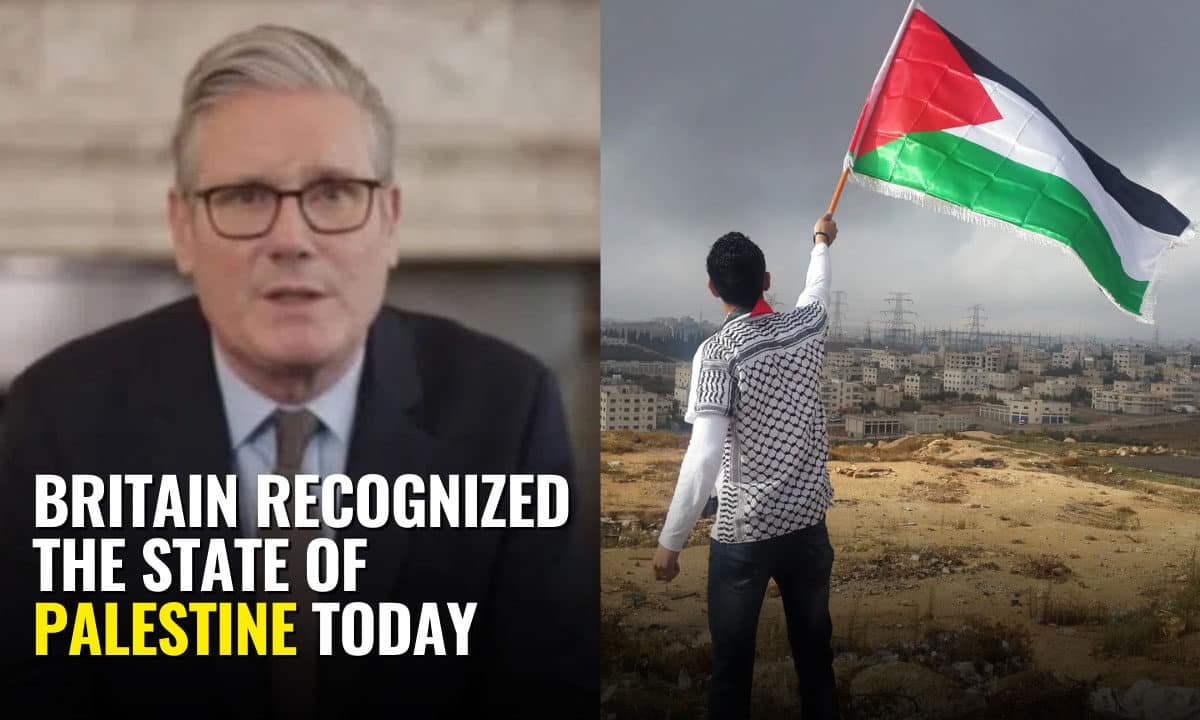Britain, Canada, Australia, Portugal Officially Recognize Palestine Amidst US and Israeli Condemnation
In a landmark diplomatic move on September 21, 2025, the UK, Canada, Australia, and Portugal formally recognized the State of Palestine, sparking strong backlash from the US and Israel. This coordinated action aims to revive peace prospects in the Middle East.

LONDON, UK – September 21, 2025 – Britain, in a historic decision, formally recognized the State of Palestine today, aligning with Canada, Australia, and Portugal in a coordinated diplomatic initiative that has drawn sharp criticism from the United States and Israel. This move marks a significant shift in Western foreign policy regarding the Israeli-Palestinian conflict.
Also Read: BREAKING: Trump Imposes $100,000 H-1B Visa Fee, U.S Entry Ban Effective 21st September 2025
Table of Contents
UK Prime Minister Keir Starmer’s Announcement
British Prime Minister Keir Starmer announced the recognition in a video statement, emphasizing that the UK is “acting to keep alive the possibility of peace and the two-state solution” amidst the escalating crisis in the Middle East. This marks Britain’s first formal acknowledgment of Palestinian statehood since the Balfour Declaration of 1917.
Starmer also condemned “the man-made humanitarian crisis in Gaza,” highlighting that “tens of thousands have been killed, including thousands as they tried to collect food and water. This death and destruction horrifies us all. It must end.”
A Coordinated International Stance
The recognition was part of a synchronized diplomatic effort involving several Western allies:
- Canada: Prime Minister Mark Carney affirmed Canada’s recognition of Palestine, offering “partnership in building the promise of a peaceful future for both the State of Palestine and the State of Israel.”
- Australia: Prime Minister Anthony Albanese stated the recognition reflects “Australia’s longstanding commitment to a two-state solution.”
- Portugal: Foreign Minister Paulo Rangel confirmed the recognition at UN headquarters, calling the two-state solution “the only path to a just and lasting peace.”
France, Belgium, Luxembourg, Malta, Andorra, and San Marino are also anticipated to recognize Palestine during the ongoing UN General Assembly this week, further broadening international support.
US and Israeli Rejection
The United States strongly opposed the recognition. A State Department spokesperson dismissed these actions as “performative gestures” rather than substantive diplomacy, reiterating US priorities: “the release of the hostages, the security of Israel, and peace and prosperity for the entire region that is only possible free from Hamas.”
President Donald Trump had previously voiced his disagreement with Britain’s potential move during his recent state visit to the UK, telling Prime Minister Starmer, “I have a disagreement with the prime minister on that score.”
Israeli Prime Minister Benjamin Netanyahu issued a fierce denunciation, labeling the recognition an “absurd reward for terrorism” following the October 7, 2023 Hamas attack. Netanyahu declared, “There will be no Palestinian state to the west of the Jordan River,” and pledged Israel’s response would follow his upcoming meeting with President Trump in the US. In response to the recognitions, Israeli National Security Minister Itamar Ben-Gvir announced plans to propose West Bank annexation at the next cabinet meeting. Netanyahu also reiterated his commitment to expanding Jewish settlements in the occupied West Bank.
Background to the Recognition
This diplomatic shift follows Prime Minister Starmer’s July ultimatum, where Britain indicated it would recognize Palestine unless Israel met specific conditions, including:
- Agreeing to a ceasefire in Gaza.
- Allowing increased humanitarian aid.
- Committing to a sustainable peace process leading to a two-state solution.
Since the ultimatum, military operations in Gaza City have intensified, and settlement expansion in the West Bank has continued. Reports from Gaza health authorities indicate over 65,000 Palestinians have been killed since the conflict escalated after the October 7 Hamas attack, which resulted in 1,200 Israeli deaths and 251 hostages.
Global Stature and Palestinian Response
With these new recognitions, at least 145 of the 193 UN member states now acknowledge Palestine as a state. Britain and Canada are the first G7 nations to take this step, signifying a major shift in Western diplomatic policy.
Palestinian Authority President Mahmoud Abbas lauded the recognitions as “an important and necessary step toward achieving a just and lasting peace.” Palestinians in Gaza viewed the recognition as “a moral victory” despite ongoing suffering, with one displaced resident stating, “This recognition shows that the world is finally starting to hear our voice.” Husam Zomlot, the Palestinian representative to the UK, described it as “an end to the denial of our existence,” emphasizing that “recognition is not a gift or a favor; it is an inherent right.”
Future Implications
The coordinated recognition places Israel in unprecedented diplomatic isolation among some of its traditional Western allies, preceding the UN General Assembly, where more countries are expected to follow suit. However, the recognition largely remains symbolic as Palestine currently lacks internationally agreed borders, a capital, or a standing army, and the Palestinian Authority does not fully control its claimed territories.
This move also puts these Western allies directly at odds with the Trump administration’s Middle East policy, potentially complicating future diplomatic coordination on regional issues.
